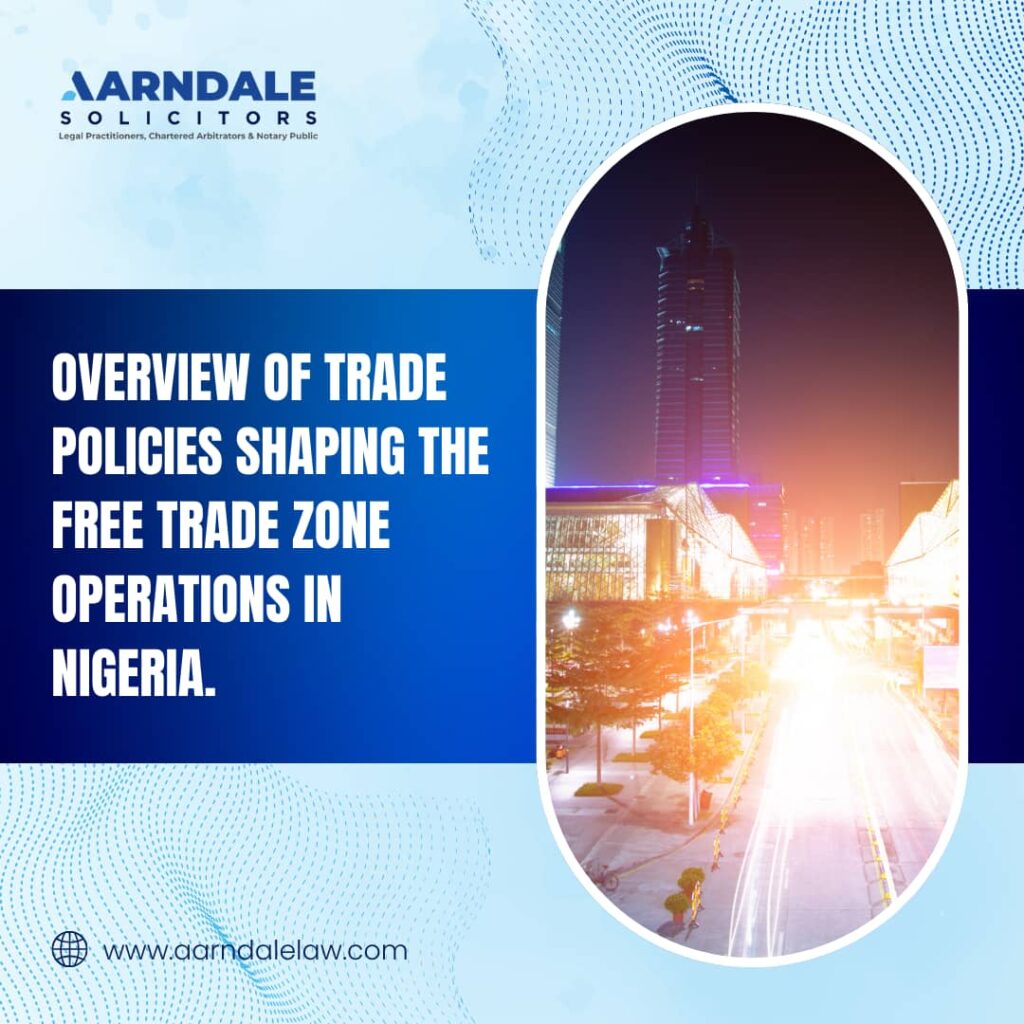

Since 2010, the Global Law Experts annual awards have been celebrating excellence, innovation and performance across the legal communities from around the world.
posted 2 years ago
A free-trade zone (FTZ) is a class of special economic zones. It is defined by the Nigerian Export Processing Zone Authority as a geographically designated area deemed to be outside the customs territory within which national regulations to company registration, production, trade and other economic activities may not be applicable or partially applicable.[1]
The establishment of Free-Trade Zones (FTZs) in Nigeria has been a crucial step in accelerating the country’s industrialization. These zones are purposely incentivized to achieve multiple objectives; these include:
FTZs in Nigeria, such as Lekki and Calabar Free-Trade Zones, attract FDIs by offering accelerated and simplified company registering, tax exemptions, duty-free imports, as well as simplified administrative procedures, amongst others. These incentives reduce operational costs, making the investment climate appealing to foreign companies. FDIs bring capital, advanced technology, and managerial expertise, crucial for economic growth and modernization.[2]
FTZs encourage domestic businesses by providing a competitive environment with incentives like tax holidays and duty exemptions. Local companies benefit from reduced operational costs and enhanced profitability, allowing them to compete with international firms.
FTZs generate direct employment from businesses within the zones and indirect employment through supply chains and ancillary services. This helps reduce unemployment and improve living standards in surrounding communities.[3]
FTZs lead to significant infrastructure development, including roads, ports, power plants, and telecommunications networks. These improvements benefit both the FTZs and surrounding regions, enhancing economic development and connectivity.[4]
FTZs facilitate the exchange of knowledge, technology, and skills between foreign investors and local businesses. This transfer builds local capacity, improves productivity, and fosters innovation. Exposure to advanced technologies and best practices helps Nigerian workers and companies enhance their skills and efficiency, contributing to long-term economic growth.[5]
The primary legal instruments governing FTZs in Nigeria is the Nigeria Export Processing Zones Act of 1992 (NEPZ Act) and the Oil & Gas Free Zone Act (OGFZ Act).
The NEPZ Act establishes the Nigeria Export Processing Zones Authority (NEPZA), responsible for licensing, regulating, and monitoring the activities within FTZs. The regulatory framework is aimed at creating an investor-friendly environment by providing incentives and reducing bureaucratic hurdles.[6]
The OGFZ Act established the Oil & Gas Free Zone Authority (OGFZA), with the power to license oil and gas free trade zones. OGFZA also has guidelines as contained in the Oil & Gas Export Free Zones Regulation 2003.[7]
The primary attraction for companies in FTZs is the comprehensive exemption from all Federal, State, local Government taxes and levies.
Companies doing business within the free-trade zones are not required to deal with multiple regulators as required by other companies.
Free Zone Companies benefit from several regulatory exemptions, notably:
To enhance the efficiency of operations within FTZs, the Nigerian government has implemented several trade facilitation policies. These policies aim to simplify procedures, reduce delays, and improve the overall ease of doing business.[8]
Single Window System: Implementation of a single window system for trade that integrates all relevant agencies, thereby streamlining the clearance processes for imports and exports.
Electronic Documentation: Adoption of electronic documentation and customs processing to expedite transactions and reduce paperwork.
Infrastructure Development: Continuous investment in infrastructure within FTZs, including transportation networks, power supply, and telecommunications, to support seamless operations.
Legal Instruments: Legal Instruments like the NEPZ Act and other legislation that clearly exempt free zone companies from corporate taxes for operations conducted within the zone has been a key factor that has facilitated trade within the zones.
Nigeria is a signatory to several bilateral and multilateral trade agreements that impact the operations of FTZs. These agreements are designed to enhance market access, reduce trade barriers, and promote investment.
African Continental Free Trade Agreement (AfCFTA): This agreement aims to create a single continental market for goods and services, allowing free movement of business persons and investments. FTZs in Nigeria can leverage AfCFTA to access a broader market.
Economic Community of West African States (ECOWAS): As a member of ECOWAS, Nigeria benefits from regional trade agreements that facilitate the free movement of goods, services, and people among member states.
Despite the numerous incentives and supportive policies, FTZs in Nigeria face challenges such as bureaucratic inefficiencies, inadequate infrastructure, and regulatory inconsistencies. To address these challenges, the following recommendations are proposed:
The trade policies affecting FTZ operations in Nigeria are designed to create a favorable business environment by offering fiscal incentives, simplifying trade procedures, and enhancing market access through international agreements. However, continuous efforts are needed to address existing challenges and fully realize the potential of FTZs as catalysts for economic growth and industrialization in Nigeria.
The content of this article is intended to provide a general guide to the subject matter. Specialist advice should be sought about your specific circumstances.
[1]https://nepza.gov.ng/freezones/#:~:text=A%20Free%20Zone%20is%20a,be%20applicable%20or%20partially%20applicable (Accessed on 10 July 2024)
[2] Martins Odeh & Golda Ukomadu (29th November, 2022) “Nigeria Free-Trade Zone @ 30: Milestones and Prospects for Inclusive Industrialization” Nigeria Free-Trade Zone @ 30: Milestones and Prospects for Inclusive Industrialization – NEPZA Accessed 9/07/2024
[2] Ibid.
[3] Ibid.
[4] Ibid.
[5] Ibid.
[6] Nigeria Export Processing Zones Act (1992) https://nepza.gov.ng/ Accessed 9/07/2024
[7] Oil & Gas Free Zones Act Oil & Gas Free Zones Authority – Nigeria (ogfza.gov.ng) Accessed 9/07/2024
[8] World Trade Organization (2021) – Trade Facilitation Agreement – Nigeria’s Category A, B, and C Commitments
[9] National Trade Facilitation Committee (Nigeria) (2021) – Trade Facilitation in Nigeria: Challenges and Prospects
Stay informed with the latest legal developments at Global Law Experts
Author


No results available
posted 9 hours ago
posted 23 hours ago
posted 23 hours ago
posted 1 day ago
posted 1 day ago
posted 1 day ago
No results available
Find the right Legal Expert for your business
Global Law Experts is dedicated to providing exceptional legal services to clients around the world. With a vast network of highly skilled and experienced lawyers, we are committed to delivering innovative and tailored solutions to meet the diverse needs of our clients in various jurisdictions.

Thinking of buying property in Brazil? Start with a full legal safety net.
✔️ Check title and ownership history
✔️ Verify no debts or disputes
✔️ Confirm zoning and permits.
#BrazilProperty #RealEstateInvesting #LegalDueDiligence #ForeignInvestment #PropertyLaw #GlobalRealEstate #InvestmentRisk #BrazilLaw

When your international business faces financial distress, quick action is key! 🔑 Negotiating with creditors, restructuring debt, and understanding insolvency laws can help regain stability. Global Law Experts is here to guide you through your options.
🌍Explore the details on our website.
🔗Link in bio
#GlobalLawExperts #CommercialLaw #BusinessLaw #LegalAdvice #BusinessGrowth #LegalTips #BusinessStrategy #LegalCompliance #Law #LegalKnowledge #LegalAwareness #Law101 #LegalEducation #IntellectualProperty

Thinking of buying property in Brazil? Don’t stop at the contract or key handover. Make sure the title is officially registered before calling it yours.
#BrazilRealEstate #PropertyLaw #GlobalInvestment #ForeignInvestors #LegalTips #DueDiligence #RealEstateRegistration #SecureInvestment

Getting a termination notice right now? Know your rights. Valid reason, fair process, proper notice they matter. Don’t let a bad dismissal walk away without accountability.
#EmploymentLaw #WorkerRights #Termination #LaborLaw #FairDismissal #WorkplaceJustice #LegalAwareness #GlobalWorkforce

Running a business is hard enough — lawsuits shouldn’t make it harder. 🚫 Protect your business with the right legal strategies and expert tools from Global Law Experts. Let’s secure your future together! 💼
🌍Explore the details on our website.
➡️www.globallawexperts.com
#GlobalLawExperts #CommercialLaw #BusinessLaw #LegalAdvice #BusinessGrowth #LegalTips #BusinessStrategy #LegalCompliance #Law #LegalKnowledge #LegalAwareness #Law101 #LegalEducation #IntellectualProperty #Infringed #Ecommerce #LegalBranding
Global Law Experts is dedicated to providing exceptional legal services to clients around the world. With a vast network of highly skilled and experienced lawyers, we are committed to delivering innovative and tailored solutions to meet the diverse needs of our clients in various jurisdictions.

Thinking of buying property in Brazil? Start with a full legal safety net.
✔️ Check title and ownership history
✔️ Verify no debts or disputes
✔️ Confirm zoning and permits.
#BrazilProperty #RealEstateInvesting #LegalDueDiligence #ForeignInvestment #PropertyLaw #GlobalRealEstate #InvestmentRisk #BrazilLaw

When your international business faces financial distress, quick action is key! 🔑 Negotiating with creditors, restructuring debt, and understanding insolvency laws can help regain stability. Global Law Experts is here to guide you through your options.
🌍Explore the details on our website.
🔗Link in bio
#GlobalLawExperts #CommercialLaw #BusinessLaw #LegalAdvice #BusinessGrowth #LegalTips #BusinessStrategy #LegalCompliance #Law #LegalKnowledge #LegalAwareness #Law101 #LegalEducation #IntellectualProperty

Thinking of buying property in Brazil? Don’t stop at the contract or key handover. Make sure the title is officially registered before calling it yours.
#BrazilRealEstate #PropertyLaw #GlobalInvestment #ForeignInvestors #LegalTips #DueDiligence #RealEstateRegistration #SecureInvestment

Getting a termination notice right now? Know your rights. Valid reason, fair process, proper notice they matter. Don’t let a bad dismissal walk away without accountability.
#EmploymentLaw #WorkerRights #Termination #LaborLaw #FairDismissal #WorkplaceJustice #LegalAwareness #GlobalWorkforce

Running a business is hard enough — lawsuits shouldn’t make it harder. 🚫 Protect your business with the right legal strategies and expert tools from Global Law Experts. Let’s secure your future together! 💼
🌍Explore the details on our website.
➡️www.globallawexperts.com
#GlobalLawExperts #CommercialLaw #BusinessLaw #LegalAdvice #BusinessGrowth #LegalTips #BusinessStrategy #LegalCompliance #Law #LegalKnowledge #LegalAwareness #Law101 #LegalEducation #IntellectualProperty #Infringed #Ecommerce #LegalBranding
Send welcome message